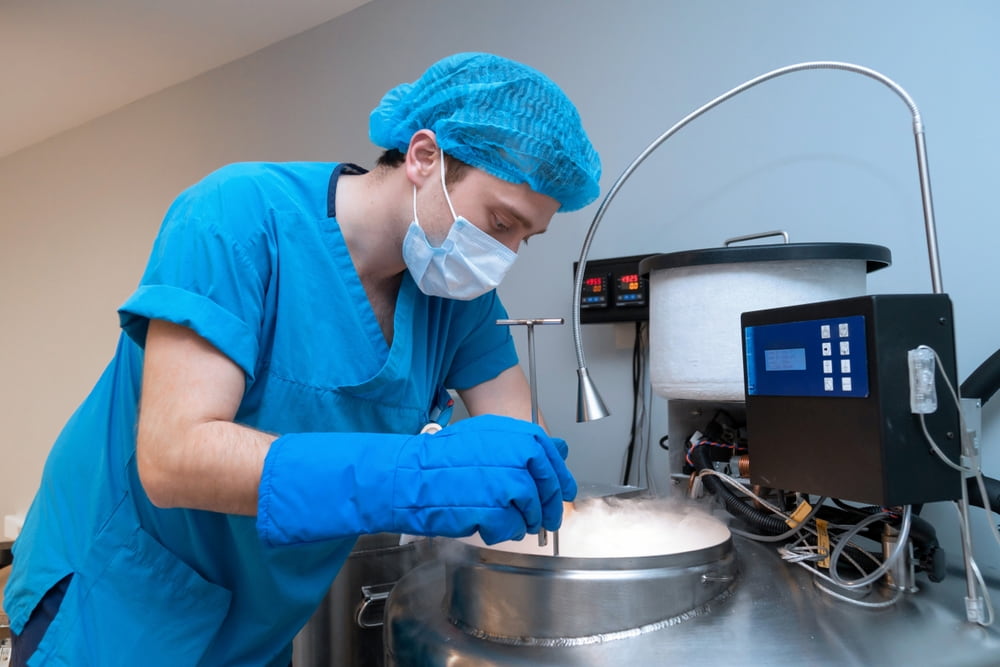
More women than ever before are choosing to have children later in life. If you are one of the many not ready to become pregnant now but want to be able to get pregnant in the future, egg freezing can help you preserve your fertility.
Whether you are single or a couple planning to have a child in the future, even after menopause, the V Fertility Center egg-freezing program can help make your dreams come true. Egg freezing is when a woman’s eggs (oocytes) are extracted, frozen, and preserved for future use. The process is medically known as oocyte cryopreservation.
Why Would Someone Freeze Their Eggs?
Egg freezing has advanced dramatically over the past few years. And while the primary reason any woman or couple would want to preserve the woman’s eggs is to preserve fertility, there are many other reasons why any woman would consider freezing her eggs.
Here are some reasons women opt to freeze their eggs:
- An underlying health issue that can affect fertility: A range of health conditions, including existing fertility issues, can hurt egg quality and fertility. If you have health issues that may impair your fertility, you can freeze your eggs so you can have kids in the future. Some health conditions threatening a woman’s fertility include endometriosis, recurring ovarian cysts, polycystic ovary syndrome, blocked fallopian tubes, and progressive diseases like sickle cell disease and lupus erythematosus.
- Cancer treatment: Any woman can benefit from egg freezing if she is anticipating chemotherapy or other cancer treatments. This is vitally important because such treatments often interfere with fertility.
- Career-related reasons: Egg freezing might be an excellent option if you are at your peak fertility but also excelling in your career. Whether you are pursuing an advanced degree, a career in the military, or just a demanding job, egg freezing can help guarantee your chances of conceiving in the future. Interestingly, some companies, like Apple, fund egg freezing to help women who choose to delay childbirth for professional reasons.
- You haven’t met the right partner: If you are getting older and haven’t met the right partner, you can freeze your eggs to preserve your fertility until you meet someone you’re ready to parent with.
Freezing eggs offers hope for women and couples who cannot or are not ready to get pregnant at the peak of their fertility.
Benefits of Sperm Freezing
Sperm freezing helps preserve a man’s fertility and can be incredibly beneficial if a man is:
- Suffering ejaculatory dysfunction
- About to undergo cancer treatment
- Working in high-risk professions like the military or where they are exposed to chemicals
- From a family with a history of abnormal Y-chromosome microdeletion
- Not able to have sex with their partner when they’re able to conceive
- Undergoing sterilization or planning to have a vasectomy
How is Egg Freezing Done?
A lot goes into oocyte cryopreservation, but the procedure is straightforward. If you are considering freezing your eggs or have agreed as a couple to freeze eggs, the next big step is to look for a reputable clinic with expertise in egg freezing. The V Fertility Center at Vejthani Hospital is an industry leader with a success rate of over 88%.
Before getting into the egg-freezing process, a fertility specialist will evaluate your ovarian reserves (this might include blood tests and a pelvic ultrasound) and screen your blood for certain infectious diseases. Next, you will take synthetic hormones to stimulate the production of multiple follicles. Blood tests may be carried out to measure your response to the medication. You will also need to visit the center for vaginal ultrasounds.
Once the follicles are ready for egg retrieval, often after two weeks, you inject yourself with human chorionic gonadotropin (hCG) to help the eggs mature. Mature eggs will be aspirated under sedation and then cryopreserved. Vitrification is the most commonly used egg-freezing process.
The Sperm Cryopreservation Procedure
Sperm collection is usually done naturally through masturbation, except in a few cases where surgical extraction is recommended. The process involves several steps:
- The sperm donor is screened for infectious diseases like HIV, Hepatitis B, and Hepatitis C.
- Next, you will provide a semen sample. Masturbation is the most common way of collecting semen; you can do it at the fertility clinic or at home. It is recommended that you abstain from sex for 2-4 days before collecting semen.
- The harvested semen is tested for sperm quality and quantity to help determine how many more samples are needed. Generally, three to six samples are collected for each desired pregnancy, depending on the quality of the sperm.
- The samples are split into multiple containers and frozen for future use.
Surgical retrieval might be used if you cannot produce sperm through masturbation.

The Next Steps
Because many diseases, some of which are deadly, can be transmitted through cryopreserved semen or eggs, it is vitally important to confirm whether or not frozen semen or eggs are infected. For this reason, frozen semen and eggs must be preserved for a minimum of 180 days, and then the donor must be retested for certain infectious diseases. The specimens can then be used if the tests confirm the donor is negative after 180 days.
Explore Your Fertility Options at VFC Center
Are you concerned about having a child now or in the future? At V Fertility Center, we have fertility options to help you start a family when you’re ready. Our supportive, skilled, and experienced team provides the best, most advanced fertility treatments in Thailand. Contact us today to discuss realizing your dream of parenthood.

The team of specialists in obstetrics and gynecology and reproductive medicine





No Comments
Sorry, the comment form is closed at this time.